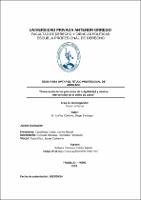| dc.contributor.advisor | Rebaza Carrasco, Héctor Martín | |
| dc.contributor.author | Ibáñez Córdova, Diego Santiago | |
| dc.creator | Ibáñez Córdova, Diego Santiago | |
| dc.date.accessioned | 2022-07-07T02:31:42Z | |
| dc.date.available | 2022-07-07T02:31:42Z | |
| dc.date.issued | 2022 | |
| dc.identifier.uri | https://hdl.handle.net/20.500.12759/9164 | |
| dc.description.abstract | La presente investigación toca uno de los problemas observados y harto
discutidos en el sistema de administración de justicia al que hemos denominado
“VULNERACIÓN DE LOS PRINCIPIOS DE CULPABILIDAD Y MÍNIMA
INTERVENCIÓN EN EL DELITO DE USURA.”. El presente trabajo se centra en
determinar de qué manera el delito de usura regulado en el artículo 214 del código
penal peruano vulnera el principio de culpabilidad y mínima intervención.
Los métodos usados en esta investigación obedecen a métodos lógicos,
siguiendo un análisis inductivo y comparativo, también hemos recurrido a los
métodos jurídicos en los cuales nos permiten interpretar hermenéuticamente el
código penal; a la vez que mediante el método doctrinario seleccionamos las
posturas que se ajusten a nuestras hipótesis.
El resultado de mi investigación se presenta a modo de conclusiones donde
finalmente expresamos que: El delito de usura regulado en el artículo 214 del
Código Penal peruano vulnera los principios de culpabilidad, debido a que se
sustenta en razones ético sociales; y el de mínima intervención, puesto que el
derecho civil establece solución a la conducta fijada en el tipo penal. | es_PE |
| dc.description.abstract | The present investigation touches on one of the problems observed and
widely discussed in the justice administration system, which we have called
““VIOLATION OF THE PRINCIPLES OF GUILT AND MINIMUM INTERVENTION IN
THE CRIME OF USURE.““ This work focuses on determining how the crime of usury
regulated in article 214 of the Peruvian penal code violates the principle of guilt and
minimal intervention.
The methods used in this research obey logical methods, following an
inductive and comparative analysis, we have also resorted to legal methods in which
they allow us to interpret the penal code hermeneutically; at the same time that by
means of the doctrinal method we select the positions that adjust to our hypotheses.
The results of our investigation are presented as conclusions where we finally
state that: The crime of usury regulated in article 214 of the Peruvian Penal Code
violates the principles of guilt, because it is based on ethical social reasons; and that
of minimal intervention, since civil law establishes a solution to the conduct
established in the criminal type. | en_US |
| dc.description.uri | Tesis | es_PE |
| dc.format | application/pdf | es_PE |
| dc.language.iso | spa | es_PE |
| dc.publisher | Universidad Privada Antenor Orrego | es_PE |
| dc.relation.ispartofseries | T_DERE_561 | |
| dc.rights | info:eu-repo/semantics/closedAccess | es_PE |
| dc.rights.uri | https://creativecommons.org/licenses/by/4.0/ | es_PE |
| dc.source | Universidad Privada Antenor Orrego | es_PE |
| dc.source | Repositorio Institucional - UPAO | es_PE |
| dc.subject | Principio de Culpabilidad | es_PE |
| dc.subject | Mínima Intervención | es_PE |
| dc.title | Vulneración de los principios de culpabilidad y mínima intervención en el delito de usura | es_PE |
| dc.type | info:eu-repo/semantics/bachelorThesis | es_PE |
| thesis.degree.level | Título Profesional | es_PE |
| thesis.degree.grantor | Universidad Privada Antenor Orrego. Facultad de Derecho y Ciencias Politicas | es_PE |
| thesis.degree.name | Abogado | es_PE |
| thesis.degree.discipline | Derecho | es_PE |
| dc.subject.ocde | https://purl.org/pe-repo/ocde/ford#5.05.00 | es_PE |
| renati.advisor.orcid | https://orcid.org/0000-0001-5928-7067 | es_PE |
| renati.author.dni | 73277351 | |
| renati.advisor.dni | 18168383 | |
| renati.type | https://purl.org/pe-repo/renati/type#tesis | es_PE |
| renati.level | https://purl.org/pe-repo/renati/level#tituloProfesional | es_PE |
| renati.discipline | 421016 | es_PE |
| renati.juror | Castañeda Cubas, Carlos Miguel | |
| renati.juror | Espinola Otiniano, Diomedes Hernando | |
| renati.juror | Tapia Díaz, Jessie Catherine | |
| dc.publisher.country | PE | es_PE |


